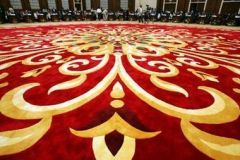In Khartoum summit, Africa had little to celebrate
By Henry Owuor
Jan 26, 2006 (KHARTOUM) — It was one of the most subdued closing ceremonies ever staged by the African Union.
As a sign that the grouping of 53 nations had little to celebrate, most delegation leaders were long gone, hours before the closure of the summit.
 While the opening ceremony a day earlier was packed, the closing ceremony told a different story.
While the opening ceremony a day earlier was packed, the closing ceremony told a different story.
There was only one smiling President among the delegates. It was Libyan leader Muammar Gaddafi.
There was also the new chairman of the AU, Congolese president Denis Sassou-Nguesso, who could not celebrate his rise to the presidency of the AU, having been picked instead of the host, Sudan.
Also braving the closing ceremony was Tanzania’s new President, Jakaya Mrisho Kikwete.
What was strange was that throughout the summit, Colonel Gaddafi seemed to do the opposite. If other presidents used the front door, Col Gaddafi used the side door.
At the opening ceremony, Col Gaddafi did not sit at his assigned seat marked with his country’s name.
He instead sat rows away flanked by Mr Salva Kiir, the leader of the Sudan People’s Liberation Movement to his right and former Zambian President Kenneth Kaunda to the left.
At the end of the day, most presidents left the hall by the side door, dodging journalists massed at the front door. This time round, Col Gaddafi used the front door, smiling away as his female bodyguards elbowed away newsmen who came surging towards him.
It was clearly the most split summit ever held by African leaders.
It could be the start of a new era. The body language was very clear. Sudan’s Omar el-Bashir thanked delegates for taking their time to visit Sudan. His tone was sullen, clearly that of a deeply wounded person.
Sudan was close to winning the chairmanship of the AU. It took a major effort by the leaders to deny President el-Bashir a seat he had craved for ever since he signed a peace deal with Southern rebels early last year.
President el-Bashir wanted to show the whole world that despite all those tags thrown at Khartoum such as being listed as a country that sponsors terrorism by the Bush Administration, Africans accepted Sudan as one of their own and did not mind being led by it.
The whole of eastern Africa and northern Africa supported Sudan. The rumblings came only from west Africa and part of southern Africa.
At the end of it all, African leaders did something which is totally un-African.
Remember all the nice villas built specifically to host the heads of state, the cool limousines, the food and, to cap it all, the friendly residents of Khartoum and Omdurman who extended a warm welcome to all visitors.
It is like the summit didn’t last beyond the opening ceremony.
Having disappointed the host, all that was left was for the leaders to rush to the airport, having done the unthinkable.
At the closed-door sessions that debated the chairmanship, the presidents found it difficult to speak against Sudan.
By tradition, the chairman is always elected soon after the opening ceremony. This means that shortly after speeches that began at 11am on Monday, the leaders would have chosen a new chairman who would have chaired the rest of the sessions. This was not to be. Even at the end of the day, no chairman had been elected.
Outgoing chairman Olusegun Obasanjo found himself chairing lengthy meetings on an issue that should have been a simple formality.
A committee was formed to find a solution to the deadlock. It was not until 11am on the summit’s last day that a new chairman was found.
The question was: Where does a new chairman start? The agenda was packed with issues that the leaders should have deliberated on.
Before any summit, member states propose agenda items such as one that calls for marking of an emancipation day in Africa – an item proposed by Nigeria.
Senegal on its part wanted the summit to debate whether to hand over former Chadian President Hissene Habre to Belgium for trial over rights abuse during his days in power.
The Habre issue has been referred to a panel of legal experts who will advise the next AU summit set for the Gambia in July.
The leaders burnt a lot of fuel but achieved nothing. The loser here is the AU itself. Gaddafi’s smile told it all. “The leader” as Colonel Gaddafi is known in AU circles signalled it all with his wide applause for one of the speeches at the closing ceremony.
It was that of President Kikwete who spoke in Swahili, surely not an imperialist language.
For the first time, the organisation did what donors wanted. Sudan does not have what they wanted. Even when Sudan finally occupies the seat, it won’t be as sweet as it would have been in Khartoum. It is a reminder that Africa dances to tunes which are totally alien to its culture.
Gaddafi capped it all in his speech: “Why is it that close to 50 years after the end of colonial rule Africans are still fighting each other in Darfur, Somalia” and hotspots remain along the Eritrea-Ethiopia border, in the Congo, northern Uganda, Liberia, Sierra Leone, Chad and Cote d’Ivoire?
After all the hullabaloo in Khartoum, the question that needs to be asked is, what is really African?
(The Nation)
